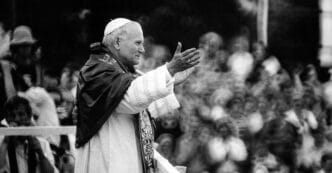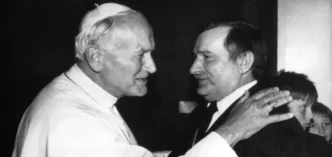St. Paul Le-Bao Tinh
Feast day: April 6
St. Paul Le-Bao Tinh was a Vietnamese priest martyred for his faith in 1857, one of approximately 130,000 Christians killed in Vietnam between 1630 and 1886. While the names of most of these martyrs have been lost, 117 of them, whose sufferings were cruelest and best documented, were beatified in four groups in the 20th century and canonized together by Pope St. John Paul II on June 19, 1988. They include nearly 100 Vietnamese priests, catechists and laypeople, as well as French and Spanish missionaries; 76 were beheaded, 21 were suffocated, six were burnt alive, five were mutilated, and nine died in prison.
The Christian evangelization of Vietnam was strong in the 16th century, so much so that two apostolic vicariates, similar to dioceses, were established there by 1659. Nevertheless, the Church and its members were often subject to persecution in the volatile political climate of the next two centuries. St. Paul Le-Bao Tinh died during the most brutal period of anti-Catholic persecution, which began in the 1820s and continued into the 1860s.
St. Paul Le-Bao Tinh was born in 1793 to wealthy parents who sent him at age 12 to study at a Catholic seminary. Known for being studious and prayerful, he chose to live as a hermit until he was asked by the local bishop to bring missionary priests back to their area. Responding to the bishop’s call to be involved in missionary activities, St. Paul Le-Bao Tinh was arrested by government officials during a persecution of Christians in 1841.
He spent the next seven years in prison at Hanoi, an experience he described in a letter to seminarians. He wrote, “I, Paul, in chains for the name of Christ, wish to relate to you the trials besetting me daily, in order that you may be inflamed with love for God and join with me in his praises, for his mercy is forever. The prison is truly a living example of hell: to chains, shackles and manacles are added anger, vengeance, lies, obscene conversations, brawls, evil acts, swearing, slander, plus boredom, sadness, mosquitoes and flies.” Yet, in hope, he concludes, “In the midst of these torments which usually bend and break others, by the grace of God I am full of joy and happiness, because I am not alone, but Christ is with me. He, my teacher, sustains the whole weight of the cross, burdening me with but a little and ultimate part.”
Political changes gave St. Paul Le-Bao Tinh a temporary reprieve in 1848. With his death sentence lifted and his time of exile commuted, he renewed his studies at seminary and later was ordained a priest.
However, the government’s persecution of Christians again intensified and St. Paul Le-Bao Tinh was arrested in 1855 for working as a priest. Classified as a criminal, he was executed by decapitation. His last words were “The religion of the Heavenly Master is perfectly true, even though our king and the sovereigns of other nations persecute it and wish to destroy it. But this religion will be victorious, and in the future it will count more adherents than it ever has had in the past.”
In his encyclical Spe Salvi (“Saved in Hope”) written in 2007, Pope Benedict XVI describes St. Paul Le-Bao Tinh’s letter from prison as a “letter from ‘Hell,'” saying it “lays bare all the horror of a concentration camp.” Yet, Pope Benedict adds, it also reveals the truth that “Christ descended into ‘Hell’ and is therefore close to those cast into it, transforming their darkness into light. … Suffering — without ceasing to be suffering — becomes, despite everything, a hymn of praise.”
Pope Benedict XVI cited St. Paul Le-Bao Tinh again in his Angelus message on the feast of St. Stephen, the first martyr, later that year. “Suffering is transformed into joy through the power of hope that comes from faith,” the pope said. “The Christian martyr, like Christ and through union with him, ‘accepts it in his heart, and he transforms it into an action of love. What on the outside is simply brutal violence — the Crucifixion — from within becomes an act of total self-giving love. … Violence is transformed into love, and death into life.'”
Reflection
O God, the power of your love is unstoppable to change a person and any situation for the good. In times of tragedy, help me to remember that you are still with me and that the power of your Spirit can bring good out of evil.
Prayer
Almighty and merciful God,
who brought your Martyr blessed Paul Le-Bao Tinh.
to overcome the torments of his passion,
grant that we, who celebrate the day of his triumph,
may remain invincible under your protection
against the snares of the enemy.
Through our Lord Jesus Christ, your Son,
who lives and reigns with you in the unity of the Holy Spirit,
God, for ever and ever.







